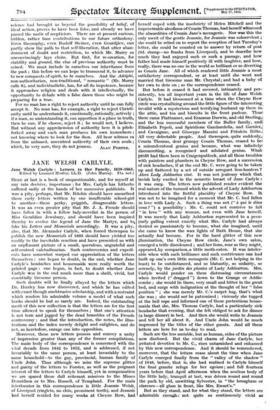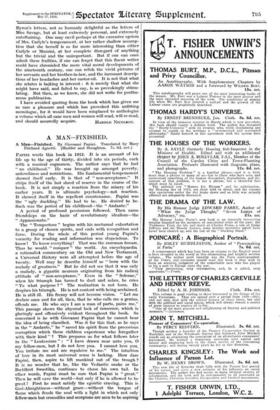JANE WELSH CARLYLE.
Jane Welsh Carlyle : Letters to Her Family, 1839-1863. Edited by Leonard Huxley, LL.D. (John Murray. 21s. net.)
HERE at last is a book of unquestionable, and for myself at any rate decisive, importance ; for Mrs. Carlyle has hitherto suffered sadly at the hands of her successive publicists. It was a pity, perhaps, that Mr. Ritchie should have unearthed those early letters written by one insufferable school-girl to another—those perky, priggish, disagreeable letters. It was an even greater pity that Mr. J. A. Fronde should have fallen in with a fellow lady-novelist in the person of Miss Geraldine Jewsbury, and should have been inspired thereby to evolve the legend of Jane the Martyr, and to fake his Letters and Memorials accordingly. It was a pity, also, that Mr. Alexander Carlyle, when forced thereupon to publish the new Memorials of 1893 should have yielded too readily to the inevitable reaction and have presented us with an unpleasant picture of a small, querulous, ungrateful and self-centred valetudinarian. Such controversies and expedi- ents have somewhat warped our appreciation of the letters themselves : one began to doubt, in the end, whether Jane Carlyle's headaches and housemaids were really worth the printed page : one began, in fact, to doubt whether Jane Carlyle was in the end much more than a shrill, vivid, but essentially tiresome person.
Such doubts will be finally allayed by the letters which Dr. Huxley has now discovered, and which he has edited with exact though unobtrusive scholarship, and with a restraint which renders his admirable volume a model of what such books should be but so rarely are. Indeed, the outstanding merit of this new collection is that the letters are for the first time allowed to speak for themselves ; that one's attention is not torn and jagged by the dead brambles of the Froude controversy ; and that the introduction, the notes, the illus- trations and the index merely delight and enlighten, and do not, as heretofore, enrage one into opposition.
Moreover, these new letters possess and convey a unity of impression greater than any of the former compilations. The main body of the correspondence is concerned with the vital decade from 1842 to 1852, and is addressed, if not invariably to the same person, at least invariably to the same household—to the gay, provincial, human family of Uncle John. Thus although we miss the supreme glitter and gaiety of the letters to Forster, as well as the poignant interest of the letters to Carlyle himself, yet in compensation we are spared those dull reiterant missives to the Misses Donaldson or to Mrs. Russell, of Templand. For the main interlocutor in this correspondence is little Jeannie Welsh, of Liverpool (ringlets, no chin, prominent teeth), and Jeannie had herself resided for many weeks at Cheyne Row, had
herself coped with the insobriety of Helen Mitchell and the impenetrable aloofness of Cousin Thomas, had herself witnessed the absurdities of Cousin Jane's menagerie. Nor was this the only merit of the gentle Jeannie, for Jeannie was subservient ; she could be relied on to report the reception of last Tuesday's letter, she could be counted on to answer by return of post (9d. stamp—no franks from Liverpool), and to describe how much they had enjoyed such or such a passage, and how father had made himself positively ill with laughter, and how, really, there was no one in the world so brilliant or so diverting as Cousin Jane. All of which rendered little Jeannie a most satisfactory correspondent, or at least until she went and married that tiresome man Mr. Chrystal ; and had a baby of her own to dote on ; so the correspondence ceased.
But before it ceased it had covered, intimately and per-• sistently, ten all important years in the life of Jane Welsh. Carlyle. It had blossomed at a time when the Cheyne Row circle was crystallizing around the little figure of the interesting i invalid with a mysterious and terrifying husband up there in, the attic, and tea and biscuits in the front parlour. Thus! there came Plattnauer, and Erasmus Darwin, and old Sterling, 1 and the less successful members of the Buller family, and' Elizabeth Pepoli, and Spiridione Gambardella, and Garnierd and Cavaignac, and Giuseppe Mazzini and Fraulein Bone.' All very delectable people. And thereupon, quite suddenly,' Cousin Thomas, dear grumpy Cousin Thomas, ceased to bel a misunderstood genius and became, what was infinitely' disconcerting, a recognized and adulated genius. What profit had there been in Craigenputtock, and all those troubles with painters and plumbers in Cheyne Row, and a succession, of sick headaches, if at the end Mr. C. were going to be taken up and flattered by a set of outside arrogant lion-hunters ? Alors Lady Ashburton vint. It was not jealousy which that lavish lady excited in the neurotic breast of Jane Carlyle : it was envy. The letters now published render evident the real nature of the turmoil which the advent of Lady Ashburton introduced into the fretful placidity of Cheyne Row. It was not to be imagined for a moment that Mr. C. had fallen in love with Lady A. Such a thing was not (" a qui le dices vous I ") a possibility : Mr. C. could not contrive to fall " in love " with any woman, not even with Jane herself. It was merely that Lady Ashburton represented to a pecu- liarly galling extent exactly what Mrs. Carlyle had always desired so passionately to become, what she imagined, until she came to know the wax lights of Bath House, that she actually had become. For in the hard glitter of this new illumination, the Cheyne Row circle, Jane's own salon, emerged a trifle discoloured ; and her lions, roar as they might, appeared, by comparison, a little moth-eaten. It was intoler- able when with such brilliance and such contrivance one had built up one's own little menagerie (Mr. C. not helping in the least) to be outdistanced, and so blatantly, so unfairly, so serenely, by the jardin des planter of Lady Ashburton. Mrs. Carlyle would ponder on these distressing circumstances when invited (" dragged ") down to the Grange or Addis- combe ; she would lie there, very small and bitter in the great bed, and surge with indignation at the thought of her " false position " ; she was merely Mr. C.'s carpet bag, that's what she was ; she would not be patronized ; viciously she tugged at the bell rope and informed one of those pretentious house- maids that she, Mrs. Thomas Carlyle, had a particularly sick headache that evening, that she felt obliged to ask for dinner (a large dinner) in bed. And then she would write to Jeannie and tell her all about it. And Uncle John would be much impressed by the titles of the other guests. And all these letters are here for us to-day to read.
Such are the less amiable, but so human, sides of the picture now disclosed. But the vivid charm of Jane Carlyle, her irritated devotion to Mr. C., rises untarnished and enhanced by this new correspondence. And it should be remembered, moreover, that the letters cease about the time when Jane Carlyle emerged finally from the " valley of the shadow of 1848, before, that is, she had realized in Carlyle himself the final granite refuge for her egoism ; and full fourteen years before that April afternoon when the soulless body of the little lady, tranquil at last, was driven round and round the park by old, unwitting Sylvester, in "the brougham or clarence—all glass in front, like Mrs. Ewart's."
But as they stand, and for what they stand, the letters are admirable enough : not quite so continuously vivid as
Byron's letters, not so humanly delightful as the letters of Miss Savage, but at least extremely personal, and extremely enteftaining. One may cavil perhaps at the excessive egoism of Mrs. Carlyle's temperament, at her rather shallow assump- tion that she herself is so far more interesting than either Carlyle or Mazzini, at her complete disregard of anything but the trivial and the unimportant. But if one can once admit these frailties, if one can forget that this fluent writer could have chronicled the more vital moral developments of the nineteenth century, one can relish the vivid pictures of her servants and her brother-in-law, and the incessant descrip- tions of her headaches and her castor-oil. It is not that what she relates is lacking in interest : it is merely that what she might have said, and failed to say, is so provokingly stimu- lating. But then, as we know, she did not write for posthu- mous publication.
I have avoided quoting from the book which has given me so rare a pleasure and which has provoked this unfitting monologue, for it would have been misplaced to anthologize a volume which all sane men and women will read, will re-read,



















































 Previous page
Previous page